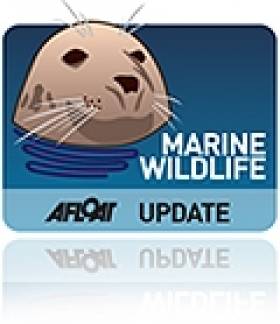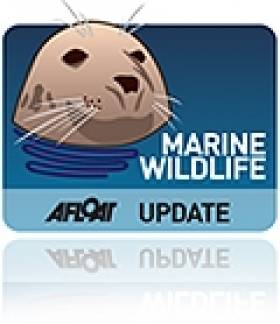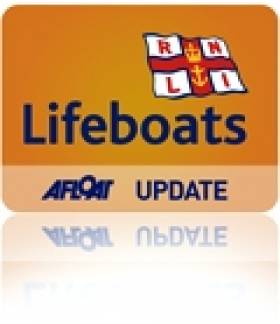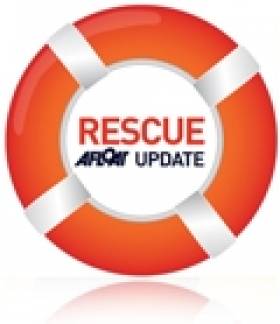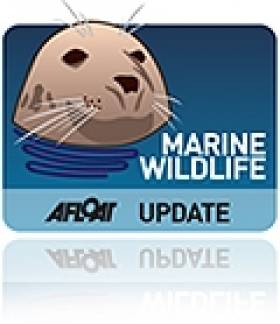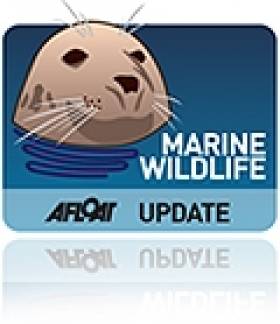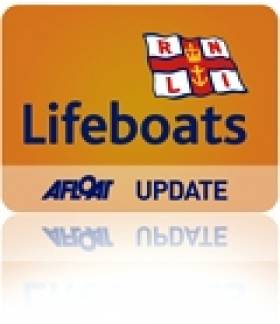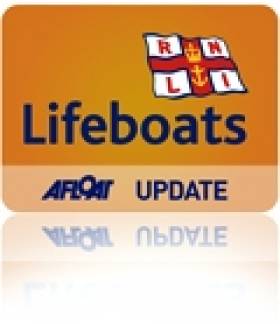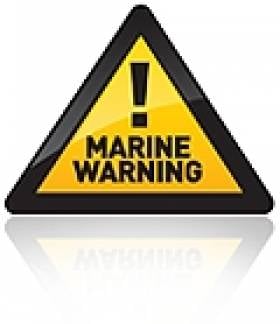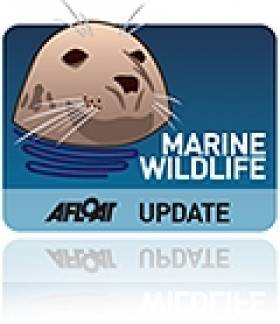Displaying items by tag: stranded
#dolphinstrandings – As Afloat.ie reported earlier, a County Mayo woman Ina Kruger successfully rescued a stranded dolphin at Easter on Keem beach, Achill. Originally rescued on Easter Sunday, the dolphin returned to the beach where the body of a second dolphin was discovered. Fortunately, the second rescue attempt was more successful and the dolphin hasn't been seen since.
'Davina' The Dolphin Saved By Flint Lifeboat In North Wales
#MarineWildlife - A dolphin from the Irish Sea that became stranded on sandbanks in the River Dee in North Wales was safely transported back to deeper waters aboard Flint’s inshore RNLI lifeboat.
RNLI volunteers from Flint were called to Airbus UK’s loading facility, just downstream from Saltney Ferry, at around 11.30am on Thursday morning (22 August) to attend to the dolphin that was in difficulty in the shallows of the river estuary.
RNLI lifeboat operations manager Alan Forrester confirmed that the crew put the dolphin inside a stretcher for transfer to the lifeboat, and that a representative from the British Divers Marine Life Rescue was on board to monitor the cetacean's condition.
"The dolphin is a fair size, so we’ll go at a very slow pace until we reach deeper waters, where we will be met by the Rhyl all-weather RNLI lifeboat," said Forrester during the mission.
The dolphin, originally named 'Dave', has since been renamed 'Davina' after she was identified as being female.
Davina was released around the North Rhyl Flats as if she were set free in any shallow waters it's feared she would become stranded again.
#RNLI - Enniskillen RNLI today (10 June) brought four people to safety in two separate incidents on Lough Erne in Co Fermanagh.
In the first call-out of the day, the volunteer lifeboat crew retrieved a man and women from their stranded cruiser which had developed engine problems and run aground on Lower Lough Erne.
The inshore lifeboat Joseph and Mary Hiley and the Rescue Water Craft (RWC) were launched just before 10am at the request of Belfast Coastguard and made the 25-minute, six-mile journey to the casualty's last known position at Crunnish Island. The wind was coming from the south east, force five with good visibility.
On arrival at the scene, the crew noted the casualties had deployed their anchor and there were strong waves hitting the starboard side of the vessel.
The RWC crew member was transferred to the casualty vessel to reassure the crew and to check for any leakage. Another crew member from the lifeboat was transferred to assist with the tow and to lift the anchor.
The lifeboat established a tow and the vessel was refloated and brought to safety at Tudor Farm jetty, close to the initial location.
Less than three hours later, the inshore lifeboat Jason Logg was launched by request of Belfast Coastguard to rescue two people on a broken-down personal water craft on Upper Lough Erne.
The crew proceeded to the casualty's last known whereabouts at the mouth of Tamlagh Bay, four miles downstream from the station towards Enniskillen.
On arrival, the crew found the troubled vessel in the reeds with two people sitting on it. The crew transferred both passengers onto the lifeboat before setting up a tow and bringing the water craft back to Bellanaleck Marina.
Elsewhere in Northern Ireland, Portaferry RNLI brought three men and a teenage boy to safety yesterday afternoon after their yacht got into difficulty off Portaferry in Co Down.
The volunteer lifeboat crew was alerted just after noon following a mayday call that there was a demasted yacht in trouble on Strangford Lough.
The lifeboat was launched minutes later and was alongside the stricken vessel, a 37ft yacht located in the narrows of Strangford Lough, at 12.10pm. Weather at the time was good with clear visibility and a flat calm sea.
One of the four casualties, who had been thrown from the vessel, had been recovered by a fellow crew member and all four were on board the yacht when the lifeboat crew arrived on scene.
Alongside, there was difficulty recovering the vessel so the mast and sail were cut away. Once cut, the lifeboat proceeded to tow the yacht with it crew on board safely back to Strangford where it was tied to a mooring.
Two of the crew were conveyed to hospital while the other two were made comfortable on the shore.
Portaferry RNLI was requested to launch for a second time later this afternoon following a report that a swimmer had gone missing in Newtownards. The lifeboat having launched was subsequently stood down after the missing person was found safe and well.
Second Cruiser in a Week Runs Aground in Lough Erne
#RESCUE - Four people were rescued on Lough Erne yesterday after their motor cruiser ran aground in the second such incident in a week, the Belfast Telegraph reports.
All on board were retrieved by RNLI lifeboat from the 29ft cruiser, which is believed to have stranded on rocks beyond the marked channel of the lough.
No injuries or damage to the vessel were reported, with a Northern Ireland Coastguard spokesperson describing it as "a routine rescue".
The coastguard blamed low water levels in the lough caused by lack of rainfall in Co Fermanagh.
Waterways Ireland has posted a marine notice warning boat users of the risks posed by "the extended period of unseasonal dry weather" for Ireland's inland waterways.
In a similar incident last Friday, three adults and two children were rescued from a cruiser that stranded in shallow water on the lough.
The Belfast Telegraph has more on the story HERE.
Omey Island Whale Buried at Sea
#MARINE WILDLIFE - The Irish Times reports that the sperm whale that was stranded in Connemara at the end of last year has been buried at sea.
The 13-metre whale carcass has attracted thousands of onlookers to Omey Island in Co Galway.
As previously reported on Afloat.ie, the sperm whale was found beached with a broken lower jaw and shed of its skin.
The whale carcass was towed out to sea west of High Island on Thursday after being deemed too large to bury on land.
"Chances are it died offshore and got washed in with the wind," said Dr Simon Berrow of the Irish Whale and Dolphin Group (IWDG).
The IWDG added that such strandings were relatively common, although as reported on Afloat.ie last year there has been growing concern over the rising number of dolphin deaths along the south coast in particular.
Dolphin Rescued in Co Wexford
#MARINE WILDLIFE - A stranded dolphin was rescued at Duncannon on Monday last week, the New Ross Standard reports.
After being spotted by a member of Fethard-on-Sea RNLI, the dolphin was aided by the lifeboat crew, with advice from the Irish Whale and Dolphin Group.
The juvenile dolphin, who appeared to show no distress from the incident, was taken out to see and released in deep water off Templetown strand.
A spokesperson for Fethard-on-Sea RNLI said the crew were "'especially pleased to have undertaken such a rescue mission with a successful outcome".
Lifeboat Rescues Jet Skiers in Wicklow Harbour
#LIFEBOATS - The Wicklow People reports on the lifeboat rescue of two jet skiers at Wicklow Harbour last week.
Wicklow RNLI was dispatched at 4.15pm last Thursday to the two men who were left stranded after one jet ski was submerged while the other suffered engine failure.
A passing fishing boat also offered assistance by towing one of the jet skis and its rider back to port.
No injuries were reported in the incident.
Lifeboat Rescues Stranded Sailor (and his dog) on Lough Derg
At 09.20hrs on Thursday morning, June 30, Lough Derg RNLI lifeboat, Toshiba Wave Warrior, went to the assistance of a person, who had been stranded since the previous afternoon, when his vessel had grounded on rocks at the mouth of the river Shannon in Terryglass Bay, at the most northerly part of the lake. The skipper of the vessel is a diabetic.
At 09.05hrs, Thursday June 30, Lough Derg RNLI Lifeboat was requested to launch by Valentia Coast Guard, to assist a person whose vessel was on rocks close the mouth of the river Shannon, in Terryglass Bay. The lifeboat with helm Eleanor Hooker, Peter Clarke and Robbie Garland on board, launched at 09.20hrs. Winds were south-westerly, Force 2-3, visibility was very good. The lifeboat was alongside the casualty vessel, a 23ft cruiser, at 09.45hrs. There was one person and his faithful dog on board.
The vessel had been grounded since the previous afternoon, and the skipper and his dog had remained stranded overnight. The skipper, a senior individual, told crew that he had got into the water and made two attempts to get the boat off the rocks himself, but without success. The alarm was raised by a local who heard his calls for help.
When the lifeboat arrived on scene, the person was quiet but alert and able to give a full history of events, he had kept warm overnight. He was assessed by Lifeboat crew and didn't give any medical history.
With a lifeboat volunteer on board, the vessel was taken off the rocks and to a landing point at Portumna Bridge closeby, 10.10hrs. Lifeboat Operations Manager Charles Stanley-Smith had called ahead and asked Deputy Launching Authority Fergal Kerney, who was in the area, to meet the lifeboat with food and a warm drink for the casualty.
Two friends of the person, who had been looking for him after it was noticed that his vessel was not at its mooring, also met the lifeboat at Portumna Bridge. They informed crew that the person suffered from diabetes.
The person, alert and able, was given food and drink and immediately taken for a medical assessment. A Garda from Portumna Garda Station was also on scene and Valentia Coast Guard had an ambulance on standby should it have been required. The lifeboat returned to station and was ready for service again at 11.15hrs
Weekend 'Super Moon' Increases Risk of Strandings
The moon will be at its closest to earth since 1993 on Saturday March 19th.
This "Lunar Perigee", or 'Super Moon' as some astrologers refer to it as, is the opposite of the "Lunar Apogee", when the Moon is furthest from Earth. Generally, the Moon looks about 12-14% larger at its perigee compared to its apogee.
This has the effect of causing very high and low tides, or increasing the range of the tide. This will expose large areas of beach and rocks which we normally don't see. Many people enjoy walking on our beaches and exploring these new areas of beach and in particular people enjoy picking shellfish to eat which become exposed during these very low tides.
The risk to the public will be of becoming stranded as the tide advances back in which can leave people in a position where they are cut off from the shore. Members of the public are cautioned to be aware of this risk and carry your mobile phone. Should you get in to trouble then call 112 or 999 and ask for Marine Rescue, giving your exact location and in particular if you are near to any conspicuous landmarks nearby to assist the Rescue Services in locating your whereabouts.
All seafarers, surfers, swimmers and divers should be aware of the increased tidal streams that will be running around our coast over the weekend; people could find themselves in peril as a result of these strong and fast tidal conditions which have not been experienced for some time now.
Post Mortem on Mass Pilot Whale Strandings Cancelled Due to Bad Weather
Plans to carry out a post-mortem examinations on thirty-five Pilot whales found dead on a beach in Co Donegal yesterday have been cancelled due to bad weather according to Dr. Simon Berrow of the Irish Whale and Dolphin Group (IWDG).
Up to thirty-five Pilot whales were found dead on a beach in Co Donegal. The whales were discovered on Rutland Island near Burton port yesterday afternoon on a beach and have been confirmed as pilot whales, mostly mothers and calves.
A team from the Galway-Mayo Institute of Technology led by Dr Ian O'Connor and the Irish Whale and Dolphin Group are planning to travel to record length, gender and obtain photographs to see if they can be matched to the recently observed Scottish animals. Skin samples and teeth will also be collected for genetics and life-history studies.
According to locals the whales had been seen feeding in the area around Aranmore Island since Tuesday.
A group of around 30 pilot whales were monitored in South Uist in the outer Hebrides, Scotland last weekend for fear of their live-stranding. The IWDG believe it may be the same group.
Pilot whales have a tendency to strand themselves in large numbers and a similar incident occurred in Co Mayo a few years ago. In June Cape Verde islanders abandoned hope for the survival of 92 pilot whales that were found washed up in a mass beaching. In September in New Zealand at least 25 pilot whales died after beaching themselves in a north Wellington bay as rescuers battled to save almost 50 more stranded.
RTE News has pictures HERE




























